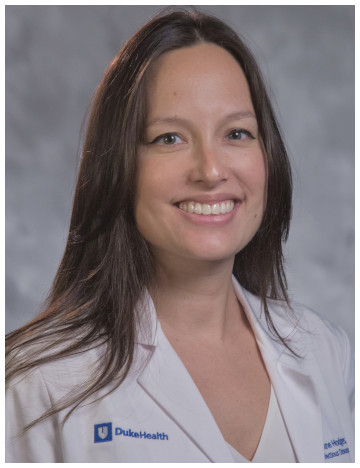
This month we are thrilled to highlight Dr. Jacqueline (Jackie) Hodges! Dr. Hodges is an Infectious Disease Specialist in the School of Medicine and a 2024 CFAR Pilot Award recipient. Her research focuses on people who inject drugs (PWID) and integrating substance use treatments with HIV prevention and care through mobile and digital health interventions.
Dr. Hodges is a lifelong learner whose curiosity has led her down interdisciplinary paths. During her undergraduate years she volunteered her graphic design talents pro bono for a non-profit in Australia, Project Futures, which combats displacement of people in Southeast Asia. This formative experience reshaped her understanding of health and how social and environmental factors, often beyond individual control, can profoundly impact health outcomes and disease risk. Her passion for global health led her to pursue a dual MD/MPH degree at Tufts University School of Medicine.
Driven by a deepening commitment to global health, Jackie sought out training opportunities during medical school thar focused on underserved populations and integrating social justice and medicine. While on clinical rotations, she observed the stigma faced by PWID which discouraged them from seeking prevention and care for infectious diseases despite their elevated risk. This insight became the foundation of her career focus: addressing the intersection of substance use and infectious disease.
Dr. Hodges completed her internal medicine residency and clinical fellowship at the University of Virginia, digging into her research in addiction treatment medicine and opioid use disorder. Through the NIH T32 program at UVA, she collaborated with mentors who founded Warm Health Technology, Inc., a digital health company developing tools to support people with HIV who have fallen out of care. These tools use behavioral science and low-barrier communication to improve retention and engagement—an approach that inspired Jackie to revisit her public health roots and explore implementation science.
Drawn by the Triangle’s robust research community, Jackie joined Duke University, where she was especially excited to work within a CFAR-supported environment. “The CFAR is incredible for supporting the methods work and providing you with collaborators, trainees, and infrastructure to build out your team. Those things are much harder to do without the CFAR, so that was a huge thing for me.” She also welcomed the opportunity to collaborate with the Duke Global Health Institute and continue her global health work.
Since arriving at Duke in July, Dr. Hodges has been preparing to launch her Gilead Sciences Grant, which builds on her earlier work at UVA with Warm Health Technology. That project aimed to improve retention and care for individuals with opioid-use disorder using suboxone—a daily medication that, like HIV prevention, requires consistent behavioral adherence. Through a secure digital health application, the team conducted a pilot study that showed users not only felt comfortable and enjoyed using the platform, including voluntarily disclosing their substance use patterns, but continued using its features even after they stopped attending clinic visits. This positive reception became the inspiration for the Gilead-funded study which will use the digital platform to integrate HIV prevention with treatment for opioid use disorder and other infectious diseases. The first phase of the Gilead study is qualitative and aims to understand ways to leverage digital technology with community partners, ultimately connecting them to suboxone, HIV prevention, and other kinds of other medical services that can be arranged with tele-encounter, touch points out in the community.
Jackie’s CFAR Pilot Award expands this idea a step further by bringing services directly to the community with mobile community clinics. In partnership with Durham Tech and the North Carolina Harm Reduction Coalition, the project will initiate PrEP medication to people already receiving opioid use treatment and other social services. This population often faces even higher HIV risk due to unpredictable use patterns and higher rates of injection drug use, making it even more critical to provide flexible, low-barrier community prevention services to improve PrEP uptake and retention.
CFAR has been instrumental in supporting Jackie’s work for both the Gilead Grant and Pilot Award. Central to both projects is the commitment to meeting people where they are outside of traditional clinical settings which makes community engagement and collaboration essential components of her research. Investigators within the SBS Core bring extensive experience in community-engaged and human-centered design research, expertise that Jackie has actively sought out and plans to continue leveraging as the studies evolve. Both projects also feature a strong qualitative research component to understand the lived experiences, needs, and relative priorities of participants. To support this, Jackie is collaborating with QualCore to develop concise, yet effective interview guides tailored for use in non-traditional, often unpredictable environments—ensuring that rich, meaningful data can still be collected in the field.
Jackie enjoys that her research provides the opportunity to continuously learn and creatively tackle complex but important health challenges with innovative technologies that have the potential to lessen the gap between those with and without resources, “we're at an inflection point where people with means are going to get more and more convenient access and people without digital access are going to get further and further marginalized and disparate outcomes.” Jackie would like to see a future where HIV research embraces flexible and scalable interventions that can quickly and safely get into the hands of the people who need them the most.